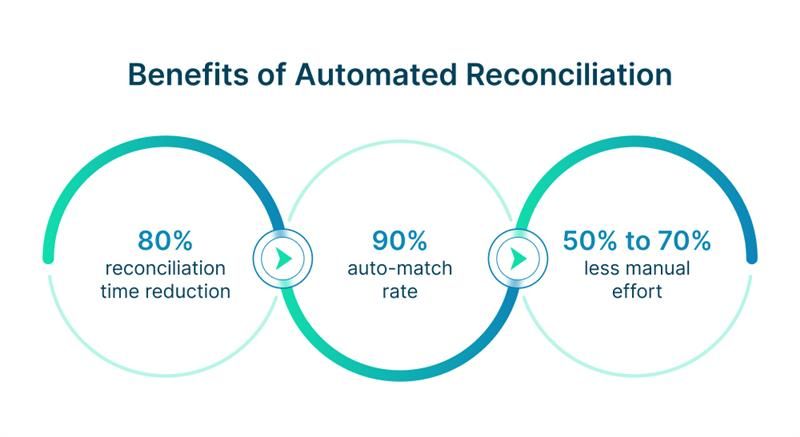Payment Reconciliation
Why daily reconciliation isn't optional anymore (Especially for Global Businesses)
Learn how global businesses use daily reconciliation to prevent fraud, ensure compliance, and optimize cash flow in complex financial operations.

Amrit Mohanty
Jul 15, 2025 (Last Updated: Oct 16, 2025)

A 2024 Forrester study found that businesses using advanced payment reconciliation automation can reduce reconciliation time by up to 70% and improve data accuracy by 50%. With hundreds of daily transactions occurring across multiple currencies and jurisdictions, global businesses face increasing pressure to maintain financial accuracy and control.
This blog explains the importance of daily reconciliation for global businesses managing complex financial operations and regulatory demands.
What is Reconciliation?

Every organization must ensure that its financial statements are accurate and do not contain any discrepancies. This is done by comparing internal records with external documents, such as bank statements, credit card bills, or payment gateway reports, also known as reconciliation. Matching the transactions helps in detecting errors, omissions, or fraud, and therefore maintains the integrity of the organization’s financial data. Businesses that perform regular reconciliation have reported up to 60% fewer financial discrepancies, which reduces the risks of misstatements.
The growing complexity of global business finance
Global enterprises often operate in environments with:
- Multi-currency transactions
- Multiple legal or operational entities
- Diverse regulatory frameworks
Fluctuating exchange rates, jurisdiction-specific tax laws, and varying reporting standards collectively complicate the reconciliation process. According to the Global Business Complexity Index 2025, 79 jurisdictions, which account for 94% of global GDP, have distinct regulatory requirements, with each demanding timely and accurate financial reporting. Additionally, with global markets operating around the clock, finance teams must supervise the process in real-time to detect discrepancies and protect cash flow integrity.
Why Daily Reconciliation is no longer optional
More frequent and automated reconciliation is required in order to increase the accuracy of the organization's financial statements. This fact is highlighted by a study, according to which 50% of the financial decision-makers at large companies felt their payments were accurately reconciled less than 80% of the time. Daily reconciliation is now essential for several reasons:
- Error Detection and Correction: Daily reconciliation helps your finance team catch discrepancies before they escalate into bigger problems. Automating the reconciliation process can reduce errors by up to 80%.
- Fraud Prevention: It acts as a safeguard against unauthorized transactions and fraud, which can otherwise go unnoticed for long periods and result in substantial losses.
- Cash Flow Management: Daily reconciliation provides an accurate and up-to-date cash position, which helps businesses manage expenses, investments, and funding needs effectively, therefore optimizing liquidity.
- Regulatory Compliance: The regulatory demands are increasing globally and require timely and accurate financial reporting. Daily reconciliation ensures that businesses meet these requirements and avoid penalties and legal issues.
- Stakeholder Trust: Regular reconciliation helps businesses build credibility with investors, lenders, auditors, and partners by ensuring financial transparency and reliable reporting.
Operational Efficiency: Daily reconciliation spreads the workload throughout the month, therefore reducing the month-end crunch, streamlining the financial processes, and improving overall efficiency.
Specific challenges for global businesses
Global businesses face challenges in reconciliation due to the complex regulatory frameworks and the need for scalable, automated solutions. Stringent regulations such as Basel III, Dodd-Frank, and GDPR are pushing companies to adopt automated reconciliation platforms, as they ensure compliance, transparency, and audit readiness across jurisdictions.
The global account reconciliation software market is expected to grow from USD 3.52 billion in 2024 to USD 8.9 billion by 2033. This will take place at a CAGR of 10.8%, with over 35.6% market share in North America, where regulatory compliance and automation are key drivers of market expansion.
Studies show that automation can reduce reconciliation time by up to 80% and has helped some companies reduce write offs by 62%. AI-powered and cloud-based platforms are being integrated with ERP systems as they provide real-time, multi-currency, and multi-entity reconciliation, essential for global operations.
Solutions for Daily Reconciliation: Technology and Outsourcing
Automated reconciliation platforms now make account reconciliation 60% to 80% faster and reduce manual effort by 50% to 70%.
Organizations that use real-time reconciliation tools report a 60% reduction in the time taken to close books. Outsourcing reconciliation to specialized providers allows companies to manage multi-entity, multi-currency, and regulatory complexities without excessive internal resource drain.
AI-driven platforms have enabled some banks to achieve a 45% reduction in reconciliation costs. As transaction volumes and regulatory demands rise, these solutions are essential for efficiency, compliance, and risk management.
Best practices for implementing Daily Reconciliation
Implementing best practices helps you deliver measurable improvements in terms of speed, accuracy, and compliance. Automated systems can accelerate reconciliations by up to 85% and reduce errors by 95% as compared to manual methods. Tracking key performance indicators enables you to identify gaps in the process execution and optimize the workflows accordingly.
Regularly updating the reconciliation procedures and leveraging automation not only minimizes manual workload but also promotes standardized processes and keeps your organization prepared for audits. These enhancements allow your finance teams to close books faster, reduce the risk of fraud, and maintain high standards of financial integrity and transparency.
Conclusion
With the average online business managing transactions across 7+ payment platforms, the complexity and fragmentation of financial transactions have increased. Automated payment reconciliation tools expedite processes and offer real-time visibility. This helps you prevent fraud, comply with regulations, monitor cash flow, and gain stakeholder confidence. Prioritizing daily reconciliation will enable you to maintain accuracy, reduce errors, and deliver reliable reporting in a fast-paced, global environment.

